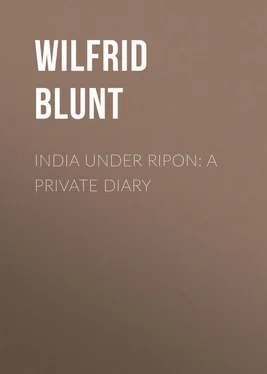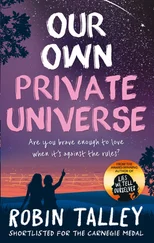Wilfrid Blunt - India Under Ripon - A Private Diary
Здесь есть возможность читать онлайн «Wilfrid Blunt - India Under Ripon - A Private Diary» — ознакомительный отрывок электронной книги совершенно бесплатно, а после прочтения отрывка купить полную версию. В некоторых случаях можно слушать аудио, скачать через торрент в формате fb2 и присутствует краткое содержание. Жанр: foreign_antique, foreign_prose, на английском языке. Описание произведения, (предисловие) а так же отзывы посетителей доступны на портале библиотеки ЛибКат.
- Название:India Under Ripon: A Private Diary
- Автор:
- Жанр:
- Год:неизвестен
- ISBN:нет данных
- Рейтинг книги:4 / 5. Голосов: 1
-
Избранное:Добавить в избранное
- Отзывы:
-
Ваша оценка:
- 80
- 1
- 2
- 3
- 4
- 5
India Under Ripon: A Private Diary: краткое содержание, описание и аннотация
Предлагаем к чтению аннотацию, описание, краткое содержание или предисловие (зависит от того, что написал сам автор книги «India Under Ripon: A Private Diary»). Если вы не нашли необходимую информацию о книге — напишите в комментариях, мы постараемся отыскать её.
India Under Ripon: A Private Diary — читать онлайн ознакомительный отрывок
Ниже представлен текст книги, разбитый по страницам. Система сохранения места последней прочитанной страницы, позволяет с удобством читать онлайн бесплатно книгу «India Under Ripon: A Private Diary», без необходимости каждый раз заново искать на чём Вы остановились. Поставьте закладку, и сможете в любой момент перейти на страницу, на которой закончили чтение.
Интервал:
Закладка:
The Ilbert Bill was in itself but a very poor instalment of that promised equality between her English and her Indian subjects which he had been sent to give. Its object was to put a stop to the impunity with which non-official Englishmen, principally of the planter class, ill treated and even on occasion did to death their native servants. It was to give for the first time jurisdiction over Englishmen in criminal cases to native judges – instead of to judges and juries only of their own countrymen. Trifling remedy, however, though it was, it roused at once the anger of the class aimed at, and a press campaign was opened against Lord Ripon of unusual violence in the Anglo-Indian journals. The Ilbert Bill was described as a revolutionary measure, which would put every Englishman and every Englishwoman at the mercy of native intrigue and native fanaticism. The attacks against Lord Ripon were certainly encouraged by the Anglo-Indian officials; and presently they were repeated in the press at home, and to the extent that the Bill became a question in which the whole battle of India’s future was being fought over and embittered. The “Times” took up the attack; the Cabinet was alarmed for its popularity, and the Queen was shaken in her opinion of her Viceroy’s judgement. Lord Ripon was left practically alone to his fate.
Those who have read my “Secret History of the English Occupation of Egypt” will understand in what way the cause Lord Ripon was still defending at Calcutta was likely to affect me. It will be remembered that, in the time of his predecessor, Lord Lytton, I had paid a flying visit to India where I had enjoyed the then Viceroy’s hospitality during two months at Simla. It had been a visit solely of personal friendship, made at the close of a long journey in Arabia, Turkey, and Persia, and that, notwithstanding a Tory education and much prejudice in favour of my countrymen, and in spite, too, of the daily society of such high Anglo-Indian officials during my stay as Sir John Strachey, Sir Alfred Lyall, and Lord Lytton himself, who had been at special pains to instruct me in their ways and methods of administration, it had left me more than doubtful of the advantage to native India of our imperial rule. Strachey’s policy of “forward finance” seemed to me one especially ruinous to India – a policy of ever-increasing expenditure, ever-increasing public debt, and ever-increasing taxation. Neither he nor Lytton had been able to convince me that the immense poverty of the agricultural peasantry was not connected with our extravagant English administration. This last Lytton, in his lighter moods, was fond of describing as “a despotism of office boxes tempered by an occasional loss of keys.”
Still I knew nothing for certain about native India. At Simla I had had no opportunity of conversing with so much as a single representative of its thoughts in opposition to the official views, nor had I caught more than a glimpse of the skeleton figures of the starving ryots as I passed rapidly by railway through their plains. When I once more, four years later, turned my thoughts to Indian travel, the single advantage I had acquired was that in the interval my political education in regard to East and West had progressed, and I had graduated in the severe school of personal experience. The case of the Egyptian fellah is not very different from that of the Indian ryot, and the economical needs of both are closely parallel. I had witnessed the Egyptian revolution, which was a revolt of the peasantry against a burden of debt, with my own eyes and at close quarters, and I had found myself behind the scenes in its struggle with European intrigue, a struggle where I knew the right to be with the native reformers, the wrong with our obstinate officials. I was determined that this time it should not be under official chaperonage I would travel, but as far as was possible on a basis of free intercourse with whatever inhabitants of the land I could get access to. As a Home Ruler in the East, I wished to ascertain what the true feeling of the country was towards its English masters, and what the prospect of India’s eventually gaining her freedom.
In this design I was of course greatly aided, as far as Mohammedan India went, by the common cause I had made with the Egyptians in their revolution, and the public advocacy of it I had undertaken. It had put me in communication with some of the liberal leaders of the Panislamic movement, and it is from them that I obtained, so to say, my passports to the confidence of their Indian co-religionists. To the Hindus I had no introduction. But here circumstances, at the outset adverse in appearance, aided me. My arch opponent in Egypt had been the Anglo-Indian Controller there of Finance, Sir Auckland Colvin, and he, having got wind of my intention, made an effort to frustrate it, by representing me to Lord Ripon as a person politically dangerous, whom it would be prudent to exclude from India, or place under official ban. Colvin’s special service in Egypt had just come to a close and he was once more in active Indian employment, and his name carried weight. Nevertheless he found Lord Ripon irresponsive. Then, having failed at head-quarters, he had recourse to the Anglo-Indian press and, through an old standing connection with the “Pioneer” newspaper, denounced me in print, an ill-advised action which, more than any favourable introduction could have done, insured me a welcome with the Hindus. Thus it happened that wherever I went I was an object of pleased curiosity with the disaffected, as one who, having incurred the anger of the Anglo-Indians, was by that fact presumably their friend. If, in the sequel, my journey achieved its object, and indeed far more than its object, it was to the “Pioneer” and other organs of hostile official opinion that I mainly owe it.
At the moment of my leaving London I received, in connection with this and another matter, a message from Downing Street asking me to call there, and the first entry in my diary refers to this. The other matter was in regard to Egypt, where it had been suggested that I should stop on my way to India and see Sir Evelyn Baring, then newly appointed to the post he was so long to hold, and concert with him a plan of restoring there the National Party. The idea had been Mr. Gladstone’s, and I reserve a full account of it for another occasion when I shall return to my Egyptian history, only premising here that it came to nothing at the time and was made a pretext later for excluding me from Egypt, reference to which exclusion will be found in the diary. The first entry of all refers to this, and to my then political connection with Lord Randolph Churchill, in concert with whom, more or less, my journey was undertaken. The Hamilton mentioned in the diary was Sir Edward Hamilton, Mr. Gladstone’s chief private secretary; the Primrose, Sir Henry Primrose, then holding the same position with Lord Ripon. I omit in transcription nearly all that relates to Egypt, reserving that part of my diary for another occasion. As to Lord Randolph, it may not be unnecessary to explain that, in the battle in which I had been engaged during the past year in Egypt, by far the most effective ally I had found in Parliament had been the young leader of the Fourth Party. Churchill, though an imperialist of the Disraeli school, was a young man full of engaging qualities, with generous impulses and a large sympathy with the weak and oppressed. I had formed a close friendship with him, and had succeeded in interesting him in my Oriental ideas to the extent that besides taking up the cause of Egyptian nationalism, he later visited India, and on his return in 1885 professed himself converted to Lord Ripon’s policy. About this, and about his short career as Secretary of State for India, I had intended to include a chapter in this volume. But it has been decided that this, with much else of a later date than 1884, shall be reserved for another occasion. Churchill entered on his office with the best of intentions and ideas, and I am still of opinion that had he remained for a few years at the India Office he would have pushed on reform there as none of his successors have had the courage since to attempt it.
Читать дальшеИнтервал:
Закладка:
Похожие книги на «India Under Ripon: A Private Diary»
Представляем Вашему вниманию похожие книги на «India Under Ripon: A Private Diary» списком для выбора. Мы отобрали схожую по названию и смыслу литературу в надежде предоставить читателям больше вариантов отыскать новые, интересные, ещё непрочитанные произведения.
Обсуждение, отзывы о книге «India Under Ripon: A Private Diary» и просто собственные мнения читателей. Оставьте ваши комментарии, напишите, что Вы думаете о произведении, его смысле или главных героях. Укажите что конкретно понравилось, а что нет, и почему Вы так считаете.












